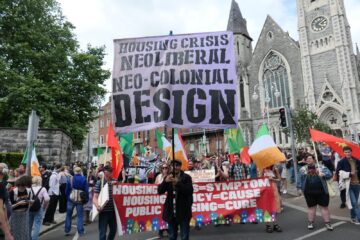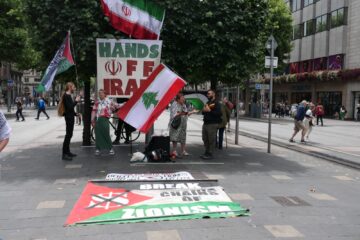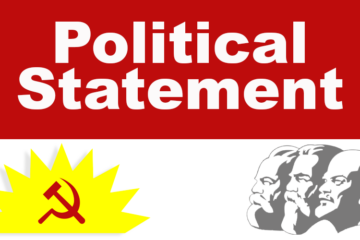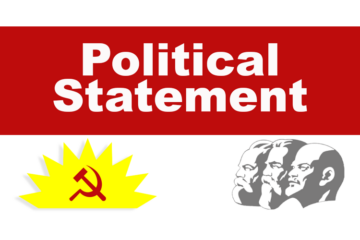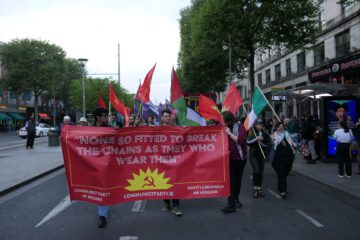National Executive Committee, Communist Party of Ireland
10 December 2018
At its regular meeting, the National Executive Committee of the Communist Party of Ireland discussed the current political situation, both national and international.
The crisis and the contradictions within the global system of monopoly capitalism—imperialism—continue to deepen with the growing tensions and divisions between and within the imperial blocs. The current “tariff wars” are but a reflection of these growing tensions and divisions. The main imperial blocs—the United States and the European Union—continue to increase military spending and to engage in military actions around the globe.
These divisions are a reflection of real material forces and tensions within monopoly capitalism about how to solve its problems and to advance the interests of capital.
Brexit is the sharpest expression of these divisions in Europe but particularly within the British state. The deepening rift within the British Conservative Party—the main political vehicle for the interests of the ruling class—may not be resolved within the strategy agreed between the EU and the British state. The crisis over Brexit is a reflection of the deep contradictions within the British ruling class itself.
The unity of European monopoly interests has been seriously fractured by the Brexit vote, which has further heightened tensions between some member-states and the EU Commission.
The Franco-German axis continues to push for greater institutional control over member-states. This is expressed in the decision of the EU Council to continue to pursue the strategy of deepening economic and political domination, to further institutionalise the dependence of peripheral states and the controlling mechanisms of the EU, and to intensify the militarist and “security” strategy of the EU.
We have witnessed the twin-track approach of the EU and the dominant economic and political interests of British capital attempting to reverse the democratic vote of the people to leave the EU. Their strategy is to repeat as often as possible that there is no alternative to the EU, there is no alternative to the present deal, and to spread fear, with the constant threat of economic catastrophe as a warning to others who might consider abandoning the EU straitjacket.
The forces that shape and control the European Union and the British state have invested too many political and economic resources to willingly allow their strategy to be derailed by decisions of the people. It highlights the nonsense peddled by social democracy and the trade union leadership that the people can only realise their best interests by remaining within the EU, and that substantial and fundamental reform of the EU is possible. The debacle surrounding Brexit proves this to be a dangerous fallacy.
The agreement now being discussed in the British Parliament, including what they call the “backstop,” has little or nothing to do with the needs and interests of the Irish people or indeed of the peoples of Britain. It is in effect a blocking mechanism, to prevent a full, meaningful departure from the EU. This agreement copperfastens the strategy enshrined in the EU treaties, the primacy of the market and fiscal controls.
Throughout the Brexit “negotiations” the Irish people’s democratic aspirations have been used, and continue to be used, as a pawn on the imperial chess board. Both the British state and the EU use the question of a “hard” or “soft” border or a “backstop” as leverage for securing and advancing their shared interests.
It is the representatives of European monopoly capital, providing solidarity with the dominant element within the British ruling class and the British state, who want to remain within the EU, who need the protection and co-operation of the EU to protect their own class interests. Their strategy is for shaping and controlling the future direction of the economic and social policies of the British government, to prevent public ownership and state supports if they pose a challenge to the interests of capital. It is for creating sufficient political space for ruling-class forces to regroup.
The Irish government is a willing collaborator in this shared tactic, further exposing its dependence and its parasitic relationship with both imperialist groups.
The limitations of both unionism and nationalism are increasingly exposed. Unionists knows that if a decision is in the interests of imperialism they will be used by imperialism, then sacrificed and discarded when it suits. At the same time Irish nationalism is trapped by its own dependence on monopoly capitalism and in particular the EU. It peddles a new TINA: “There is no alternative to the EU.”
The British-imposed partition and its border in Ireland have shown themselves to be the primary obstacle to progressive advance. Partition has failed, and will continue to fail, and all political solutions, temporary or otherwise, will fail on that central fault line. The continuation of partition, like continued membership of the European Union, is a roadblock preventing fundamental economic and social change.
The CPI expresses its solidarity with workers in struggle in Tesco and Grafton Language Teachers and workers facing further redundancies in Bombardier. Workers continue to pay a heavy price, with the system making more people pay as it continues to seek solutions to its ever-deepening crisis.
A recent report shows that more than 40 per cent of workers now experience precarious employment. This, coupled with precarious shelter and precarious health provision, shows that the system is incapable of creating a society in which workers’ needs and interests are primary in all economic, political and social decisions.
The CPI welcomes the moves to legislate for allowing women to obtain an abortion if they so desire, in line with the demands arising from the mass mobilisation for repealing the eighth amendment. The same mass mobilisation needs to be brought to bear in pushing this democratic demand throughout the whole country.
The CPI again asserts that workers and their organisations need to fight for universal public housing as the only lasting solution to the growing housing crisis. Universal public housing is the only demand that has the potential to break the grip of landlords and bankers on the provision of shelter. We need also to re-energise the water movement to push the demand for a constitutional amendment guaranteeing the people’s ownership of water.
If the people are not mobilised, the state will succeed in obtaining a solution in the interests of capital and not in the interests of the people.




